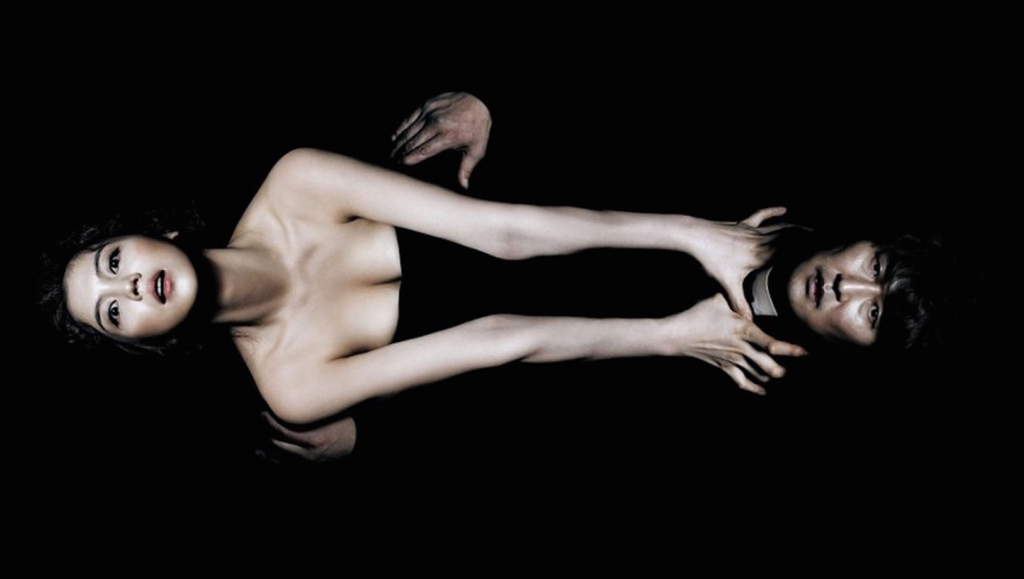Adored by geeks for his stylish violence, lauded by the arthouse for his immaculate camera, and beloved by many for his Vengeance Trilogy, South Korea’s resident idiosyncratic auteur, Park Chan-wook, hit a minor misstep in his career with the 2006 romantic comedy I’m a Cyborg, but That’s OK. But with the grim-sounding vampire film Thirst, he seemed poised to regain any lost footing. Unfortunately, Thirst falls somewhere between the whimsicality of Cyborg and the brutality of his previously lauded work, landing as somewhat of a disappointment, unsuccessfully marrying many of Park’s various visions, tones, and quirks. Suffering from a muddled narrative, an overextended and dragging last half, and tonal inconsistency, the film seems confused, never quite nailing down what it’s trying to say or achieve. As a religious screed, it isn’t invective; as a morality tale, it works only in moments and even then with little bite; and as a love story, it’s amusing moments are as plentiful as its hang-ups.
Popular South Korean actor Song Kang-ho (The Host, Park’s Sympathy For Mr. Vengeance) plays Sang-hyun, a priest respected for his compassion and altruistic dedication, but whose faith is seemingly tested when a patient and friend lapses into a coma in front of his eyes. Tireless in his efforts to help people, and seemingly galvanized by the grave incident that has befallen his friend, Sang-hyun travels to Africa, volunteering as a guinea pig for an experiment that could potentially cure a deadly and widespread epidemic. During the testing, he is infected and dies, but the blood used to attempt to save his life appears to be tainted, and he soon rises from the dead, chanting a strange mantra: “Like a leper rotting in flesh, let all avoid me. Like a cripple without limbs, let me not move freely. Remove my cheeks, that tears may not roll down them,” etc. and so on. News travels of this “miracle,” and Sang-hyun becomes a much sought-after religious savior, with a small cult of devotees. Desperate citizens beseech him to bring good fortune to their ailing family members, and he tries to dismiss any rumored healing powers as simply psychological panacea, though he eventually relents to visiting a few homes out of empathy.
One such home is that of the Ra family, who has a sick son, Kang-woo (Shin Ha-kyun, the mute from Mr. Vengeance), who coincidentally was a childhood friend of Sang-hyun when he was an orphan. Sang-hyun repays the long-forgotten friend by “curing” his cancer, which goes into remission (though seemingly through nothing of the priest’s own doing). During this time, Sang-hyun finds himself magnetized to the introverted and sullen adopted daughter of the family, Tae-ju (Kim Ok-Vin), and she too is drawn to him. Tae-ju is (oddly enough) married to her brother, and yet she’s still treated like an indentured servant and hates her miserable existence, her overbearing vodka-sozzled mother/mother-in-law, and her dimwitted goofball husband. Meanwhile, Sang-hyun is starting to feel the awakening hunger pangs of his nascent bloodlust, going as far as to clandestinely drink the blood of his coma patient. Doing so keeps his infection at bay — which manifests in blistering lesion outbreaks when he hasn’t fed — but he is already past his moral crossroads before he considers the consequences.
And just as he abandons his moral compass, he too succumbs to his lust, lust, lust of Tae-ju; the two swap spit, fluids, and eventually blood types, making her too the owner of supernatural powers and the curse of immortality. While the priest attempts to reconcile his vampiric desires with his still existing value of life, via an ethically flawed idea of feeding on lesser victims — unsuspecting patients, whose unconsciousness precludes them from being aware of any missing plasma, and suicide patients on the way out — rather than going for all out carnage, Tae-ju becomes more nihilistic and rapacious, insisting her ineffectual husband (who couldn’t hurt a fly) is beating her and soon tricking the jealous priest into plotting his old friend’s murder. All the while, Sang-hyun and Tae-ju’s love grows more fractious, as she evinces contempt for Sang-hyun’s “compassionate” ways.
The film then takes a ridiculous and surrealist detour that moves the already existing absurdist plot past the point of simply amusing quirk (or half-hearted comic allegory) and into the off-the-charts, credulity-straining realm of no return (even for this fantastical story). The already strange rhythm and pace of the film, which feels singularly peculiar initially, becomes almost all but irredeemable. The picture should wrap up, but it persists with a Kubrick-ian section where the Ozzie & Harriet-like couple’s vampire love gets ugly as they bicker over who has had their fill of blood and their rules of non-murder quickly fly out the window (a scene all shot within a very Stanley-looking, cynically white-painted room). It’s but the final nail, as the narrative essentially collapses under the weight of Thirst‘s ambitions and various strands, not to mention the focus change from the priest to Tae-ju, which disconnects us further (and that’s with barely a mention of the overbearing mother and the priest’s blind mentor who he seeks absolution from, two more distracting sub-plots). Ultimately, the film fails to reconcile or articulate its themes of love, lust, faith, and temptation, and its narrative struggles to remain coherent in its last act. It admittedly does build to an awe-inspiring climax of conscience and sacrifice, but even this takes so long to get to that it ultimately feels like a case of too little too late.


Comments are closed.